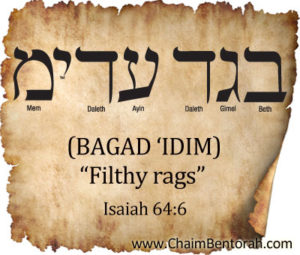HEBREW WORD STUDY – FILTHY RAGS – BAGAD ‘IDIM בגד עדימ
Isaiah 64:6: “But we are all as an unclean thing, and all our righteousnesses are as filthy rags; and we all do fade as a leaf; and our iniquities, like the wind, have taken us away.”
 This is a favorite verse when you are witnessing to someone who thinks their good works will get them to heaven. Ephesians 2:8-9 clearly teaches that it is by grace we are saved, through faith, that not of any good things we do so we certainly cannot boast about how good we are.
This is a favorite verse when you are witnessing to someone who thinks their good works will get them to heaven. Ephesians 2:8-9 clearly teaches that it is by grace we are saved, through faith, that not of any good things we do so we certainly cannot boast about how good we are.
But soft, is this really speaking of our soul salvation? Actually, the context is not a reference to the lost but to those who claim to be the people of God. The nation of Israel had moved so far away from God with their hearts that even their praise and worship became as filthy rags. Such expressions of worship to God are as useless as the filthy rags at a car wash. If the filthy rags used on your car is used for the next car then your car’s filth will just be wiped onto the next car which just went through the wash. So the context is not evangelism, although it can be used for that, the context is really referring to you and me who do worship and praise God.
All our modern translations seem to walk in lockstep on referring to this as filthy rags or garments. Some will say polluted garments or stained garments. In other words if we worship God with our heads and mouths and not our hearts, these righteous, good acts that we do, the songs we sing to God, closing our eyes and singing with that little slur that country singers and modern pop singers like to do to show they are being sincere are just filthy rags to God. After performing our worship and praise, putting our tithe in the offering plate, sitting through a half hour commercial from the preacher we expect God to say: “Oy, what good thing you’ve done for me Bunkie, tell me, perhaps I should answer a prayer or two?”
But really what are filthy rags or polluted garments. I mean people wore the same clothes every day, most people wore filthy garments. The word for filthy is ‘idim and rags isbagad in Hebrew. The word for rags bagad means a covering hence some sort of garment. But in its Semitic root, it is a covering of one’s treachery. The prophet is saying that all your righteous acts, your acts of justice and good are just deceit, a covering for your treachery. Not only that they are filthy or ‘idim. ‘Idim is a word for a cloth that is used when a woman menstruates. This harkens back to the beginning of the verse where the prophets says that the people are unclean. A woman menstruating was considered to be unclean. Menstruation occurs when the lining of the uterus thickens in preparation for pregnancy. If pregnancy does not occur, the lining is released in what is known as menstruation. The lining really serves no value if there is not reproduction to take place.
When we worship God with our mouths and not our hearts, when we do it to impress people around us as to our holiness or to bribe God we are being bagad, deceitful and treacherous toward God. We say we love Him only to get what we want. Not only that it is ‘idim, that is it is like menstruating, releasing what is of no further value as we are not going to reproduce anything anyways. We are not going to win any one to Lord playing our little bagad games..
So if you think this verse does not apply to you because you are already a Christian, saved by the blood of Jesus Christ and not any of your works, think again, take a second look, because this verse is just as much for the believer as the unbeliever.







I’m glad I read “Everlasting Love” yesterday..there is still hope for me 👍